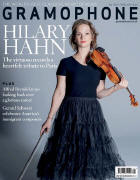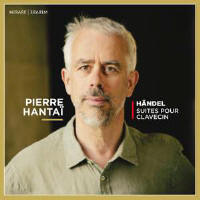Texte paru dans: / Appeared in: |
|
|
Outil de traduction (Très approximatif) |
|
|
Reviewer: Lindsay Kemp The booklet note for this release points out some interesting things about the trajectory of Handel’s ‘Eight Great’ harpsichord suites from the time they were first published in 1720 up to the present day. First, that they were easily among the most admired harpsichord pieces of their time, throughout Europe; second, that they subsequently fell from favour as a result of a widespread feeling that they were not as worthy of attention as Bach’s; and third, that Pierre Hantaï was himself of that mind until he met Sviatoslav Richter, who, when informed that he was a harpsichordist, asked him ‘do you play Handel?’, thereby prompting a rethink. So thank you, Sviatoslav Teofilovich, for leading one of the very finest harpsichordists of our day to take up the challenge of bringing to life four of these suites, which depend more than most on a performer’s ability to identify the music’s bigness of character and use total mastery of the instrument to bring it out. For make no mistake, Hantaï does this. His performances are cleancut and thought-out, full of pert little trills and mordents, tasteful rhythmic dislocations and a variety of spread-chord formulations. They are wonderfully effective in the quieter, slower movements, where his instrument sings sweetly, but the range of shrewdly used harpsichord techniques extends into the more extrovert movements too, this time to conjure energy, momentum, rhythmic excitement and sonic weight. The variations in the D minor Suite (HWV428) are, as you might expect, a fitting showpiece of Hantaï’s controlled virtuosity, but the way he can subtly articulate a vigorous fugue such as that of the F major Suite (HWV427) to give it shape and incident, or stir your blood with the sturdy dance swagger of the E minor Gigue (HWV429), is reminiscent of (and perhaps even more accomplished than) Scott Ross at his best. Last, but not least, there is his busy and brilliant range of ornamentations, which can swell the sound, emphasise an individual moment or transform disjointed harpsichord notes into violin-like swirls and flourishes. You can be sure these last are his own, because nobody could ever write them down. And for the music of the great spur-of-the-moment artist that was Handel, what could be more perfect? |
|




